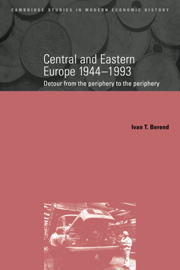Book contents
- Frontmatter
- Contents
- Preface
- Acknowledgments
- I Out from Europe: the introduction of state socialism, the Stalinist decades, and revolts against them
- II Temporary success and terminal failure: the post-Stalinist decades – modernization, erosion, and collapse
- 4 Post-Stalinist state socialism and its legitimization
- 5 Economic and social performance of state socialism, 1950–89
- 6 Crisis and erosion of state socialism, 1973–88
- 7 The collapse: a revolutionary symphony in four movements, 1989
- III Back to Europe? Post-1989 transformation and pathways to the future
- References
- Names index
- Subject index
4 - Post-Stalinist state socialism and its legitimization
Published online by Cambridge University Press: 28 October 2009
- Frontmatter
- Contents
- Preface
- Acknowledgments
- I Out from Europe: the introduction of state socialism, the Stalinist decades, and revolts against them
- II Temporary success and terminal failure: the post-Stalinist decades – modernization, erosion, and collapse
- 4 Post-Stalinist state socialism and its legitimization
- 5 Economic and social performance of state socialism, 1950–89
- 6 Crisis and erosion of state socialism, 1973–88
- 7 The collapse: a revolutionary symphony in four movements, 1989
- III Back to Europe? Post-1989 transformation and pathways to the future
- References
- Names index
- Subject index
Summary
‘Our system is most frequently characterized as a … dictatorship of a bureaucracy over a society,’ noted Václav Havel, the outspoken dissident in the late seventies. ‘I am afraid that the term ‘dictatorship’ … tends to obscure rather than clarify the real nature of power in this system.’ In Havel's interpretation the regime differed from a classical dictatorship since it was part of an international community and possessed an effective mechanism, ideology, and some kind of revolutionary atmosphere. Moreover, it became a part of the world system in coexistence with the West. ‘What we have here,’ he continued, ‘is simply another form of the consumer and industrial society …. [T]he post-totalitarian system has been built on foundations laid by the historical encounter between dictatorship and the consumer society’ (Havel, 1985, pp. 24, 27, 38).
In Havel's judgment, Central and Eastern European state socialism in the seventies was thus a special hybrid of a dictatorship and a ‘normal’ industrial consumer society. Although reforms were cautious and limited, and revolts and revolutions were ruthlessly suppressed, they nonetheless challenged the regime, provoking unavoidable responses and gradually generating certain changes. A part of the regime's elite, which was deeply disappointed with and itself frightened by the irrationality of Stalinism, now sought, with a revitalized enthusiasm, to replace counterproductive Stalinism with a moderate and pragmatic policy to satisfy the people's interests and stabilize the regime.
As a consequence, and as a result of a permanent inner struggle between short-sighted hard-line conservatives and liberal reformers. Central and Eastern European state socialism changed and arrived at its post-Stalinist stage. The transformation, however, was rather gradual in time and uneven in space.
- Type
- Chapter
- Information
- Central and Eastern Europe, 1944–1993Detour from the Periphery to the Periphery, pp. 155 - 181Publisher: Cambridge University PressPrint publication year: 1996



